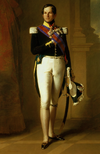Paulus de Withe
| Paulus de Withe | |
 | |
| Full name | Paulus de Withe |
|---|---|
| AKA | The Civil Clerk (de Civiele Klerk) |
| Physical information | |
| Species | Human |
| Gender | Male |
| Biographical information | |
| Date of birth | 1648 AN |
| Residence(s) | Withe, Batavia |
| Nationality | Batavian |
| Occupation |
Civil servant |
Paulus de Withe (1648 - ...) was prime minister of Batavia between 1685 AN and 1697 AN. As member of the Radicalen, he succeeded his fellow party member and sitting prime minister Jacques Montrarde in 1685 at the outbreak of the Batavian Revolution. He successfully fought off the syndicalists, by keeping control over the capital, and isolating the armed groups from each other. Confronted with financial disaster, he urged his party to lower military spending and request military aid from neighbouring countries. With this, he received a lot of criticism from his own party, of which the more reactionary forces accused him to be a puppet of the conservative monarchists.
In contrast with his predecessor, Paulus never served in the Batavian Armed Forces. As a boy, being born in the Baronial house of de Withe, he saw it as it duty to protect the lands and his peoples. Wanting to serve in the Army had traditionally been a way for the nobility to proof loyalty to the country, but due to the occupation of Batavia during his youth (the stateless period between 1614 and 1661), his parents made him study to become a civil servant instead of a military officer.
In 1679 AN, he succeeded his father as baron of Withe. He joined the Radicalen the next year, and won a seat in the Lagerhuis. He became minister of Education under the Montrarde Administration. Eventually he was appointed to succeed his mentor and prime minister and played an important role in orchestrating the successes at the Blanckenhof Accords.
He is also known as the prime minister who in the winter of 1685 AN reintegrated Kasterburg into Batavia, ending its autonomous status.